Democratic Republic of the Congo: Essential aid helps families make a new start
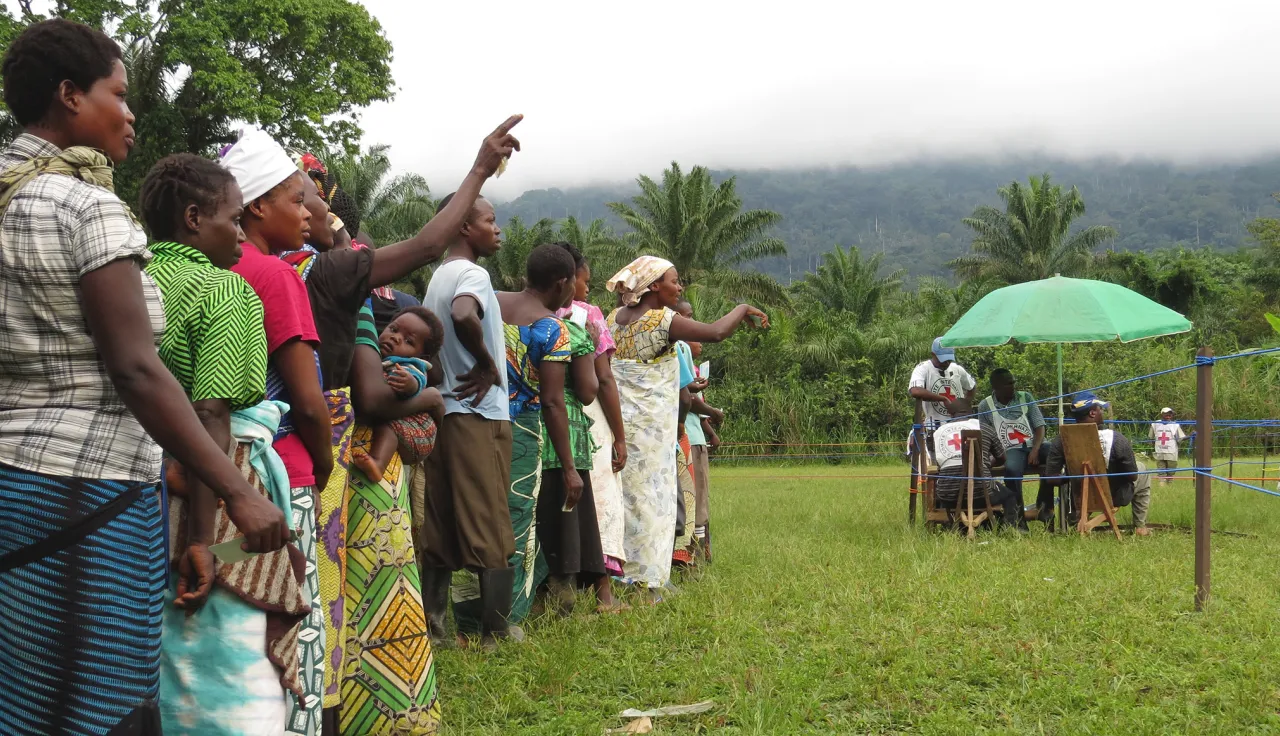
The armed conflict in the Democratic Republic of the Congo (DRC), which has lasted over 20 years, is still driving families from their homes. Those who return, after months or even years of living in the bush, are often left with nothing. The ICRC has been distributing essential household items in the remote North Kivu province: 14,000 people in Rungoma have received aid.
It is barely 8 a.m. Mist still lingers over the surrounding hills, but 41 aid workers – ICRC staff and volunteers from the Red Cross Society of the Democratic Republic of the Congo – are toiling to turn Rungoma's "playing field" into a distribution point. Families are already starting to arrive, having walked for up to three hours to reach there. This was the farthest that ten trucks – laden with cooking pots, cloth, blankets and bed mats – could make it. "Today is our second day," explained Marcel Mbilizi, who is in charge of the operation. "But we still have a lot to do. We need to put up the posts and ropes for people to know where to go, set up tables to check people's details, put up parasols to have some shade, give instructions to the volunteers and explain how things work to the villagers."
When they first visited six months ago, ICRC staff witnessed the dire living conditions in Mutongo, Kaseke and Misoke, which lie between the Masisi and Walikale territories of North Kivu, 1,500 kilometres from the capital, Kinshasa. Forced to live in the bush for years, some families have taken advantage of the relative calm to return home. "Because of the conflict, these villages had been burnt down three years in a row since 2011," said Alexis Muhindo, in charge of protecting civilians. "When the villagers came home, there was nothing left. Their houses had been destroyed. Bed mats, blankets, cooking utensils... all gone."
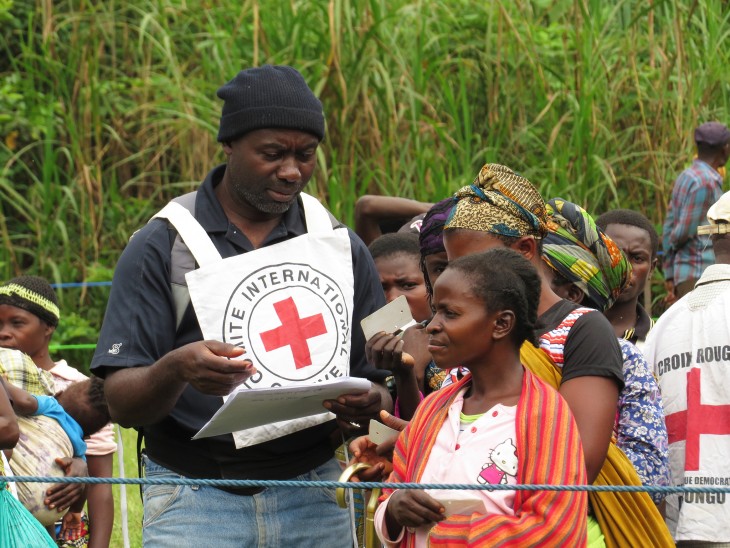
Getting ready: Someone from each family is put in the queue so they can be checked against the list of beneficiaries as quickly as possible. CC BY-NC-ND/ICRC/Elodie Schindler
Alexis still remembers the surprise and joy of the people here when he and other staff members – the only aid workers to reach this remote region in years – first arrived. It took them three hours by motorcycle to cover the 32 kilometres of narrow, overgrown trail separating the village from the nearest town. Then they had to cross the river by barge as the bridge had collapsed. Once on site, they found the situation was desperate. "Villagers told us many of them slept on the ground, without even a sheet to lie on," Alexis said. But the dangerous conditions prevented the ICRC from returning to the area for four months to carry out a more detailed assessment of people's needs.
In early 2015, delegates were finally able to start taking aid to these communities. "We spent five days going door-to-door, registering families. Some didn't even have anything to collect water in," said DRC Red Cross volunteer Jean-Pierre Tshishimbi. "These things will definitely improve their day-to-day lives."
A young woman named Chance was one of the people receiving ICRC aid. Pregnant with her first child, she recently returned home after two years spent far from her village of Misoke. "I was happy to come home, even if the situation was difficult. My husband and I have built a house, but it's still empty for the moment," she said.
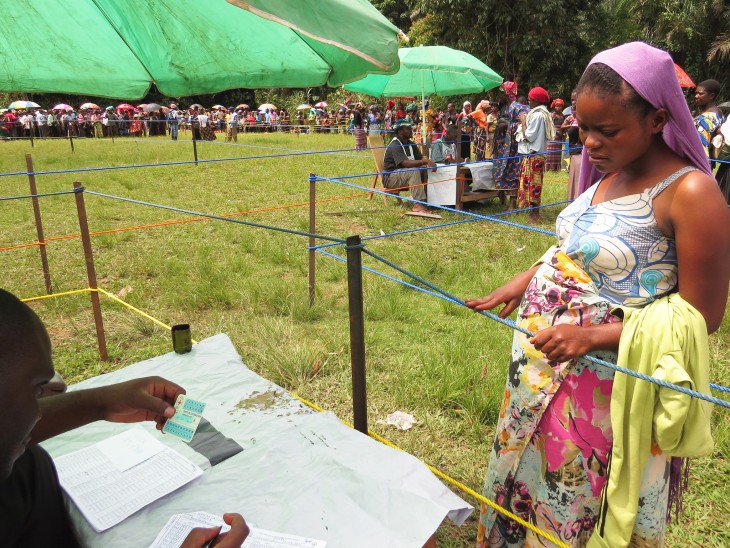
DRC Red Cross volunteer Jean-Pierre Tshishimbi checks the identity of Chance, a young woman pregnant with her first child. After living in the bush for two years, Chance returned to her home village of Misoke in January 2015. CC BY-NC-ND/CICR/Elodie Schindler
The day before, there had been singing and dancing in the villages. Now, not far from the distribution site, the atmosphere remained upbeat as families bustled around sorting out what they had got. Fidéline returned with her husband and their nine children to Misoke when she heard that her neighbours had begun to move back. After two years away, they came home to find their house destroyed. They had to stay with family while her husband built them a new hut. Smiling brightly, she set down her new bucket, plastic tarpaulin, and 17-kg bag containing cooking pots, three blankets, three bed mats, cloth, soap and a hoe. "There has been a lot of rain, and our roof is made of palm leaves, which doesn't keep the rain out," she said. "This tarpaulin will keep us dry tonight. Nobody had enough cooking pots before either: we were always having to borrow them from one another. Now life will be easier."
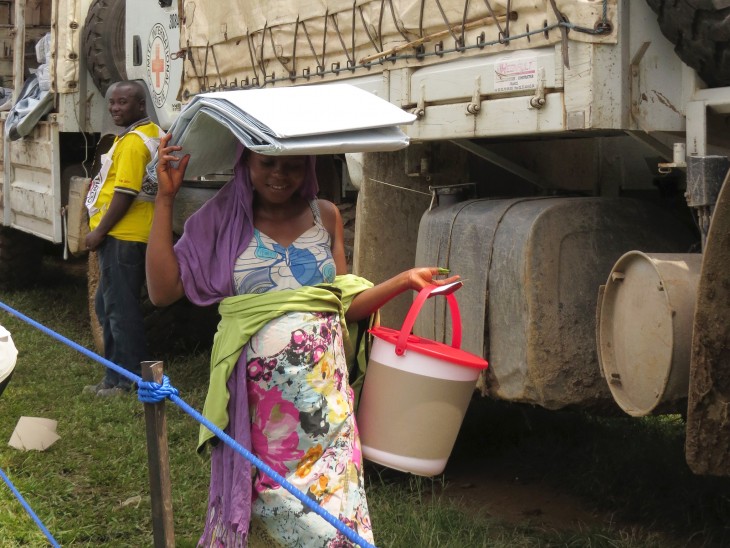
Chance received a bucket and a tarpaulin, and was on her way to collect her 17-kg bag containing cooking pots, three blankets, three bed mats, cloth, soap and a hoe. CC BY-NC-ND/ICRC/Elodie Schindler
Things came to a close in the early afternoon, so the villagers could make it home before dark. "A total of over 2,000 families received aid in a calm and organized manner," said Emeneya Muhima, head of disaster relief for the DRC Red Cross in Mutongo. The event was a success, especially given the logistical obstacles involved. Security was one of them, but there was also the remote location: it took the trucks two days to drive 160 kilometres and take roughly 40 tonnes of cargo to the nearest accessible point.
In the next few weeks, ICRC delegates will return to Rungoma to deliver food. After that, security conditions permitting, delegates hope to start distributing seed. Chance, Fidéline and 14,000 others like them will then be able to replant their fields and make a living in the villages of Mutongo, Burumbi, Kaseke, Misoke, Itondo, Kalambrio, Muhirya and Myanga.
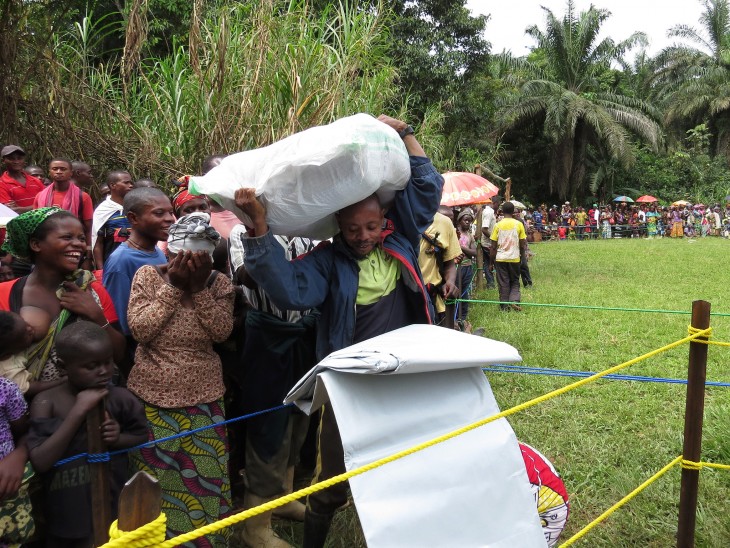
Overjoyed families getting ready to return to their villages. Some have up to three hours' walk ahead of them. CC BY-NC-ND/ICRC/Elodie Schindler
Photos : CC BY-NC-ND/CICR/Elodie Schindler



